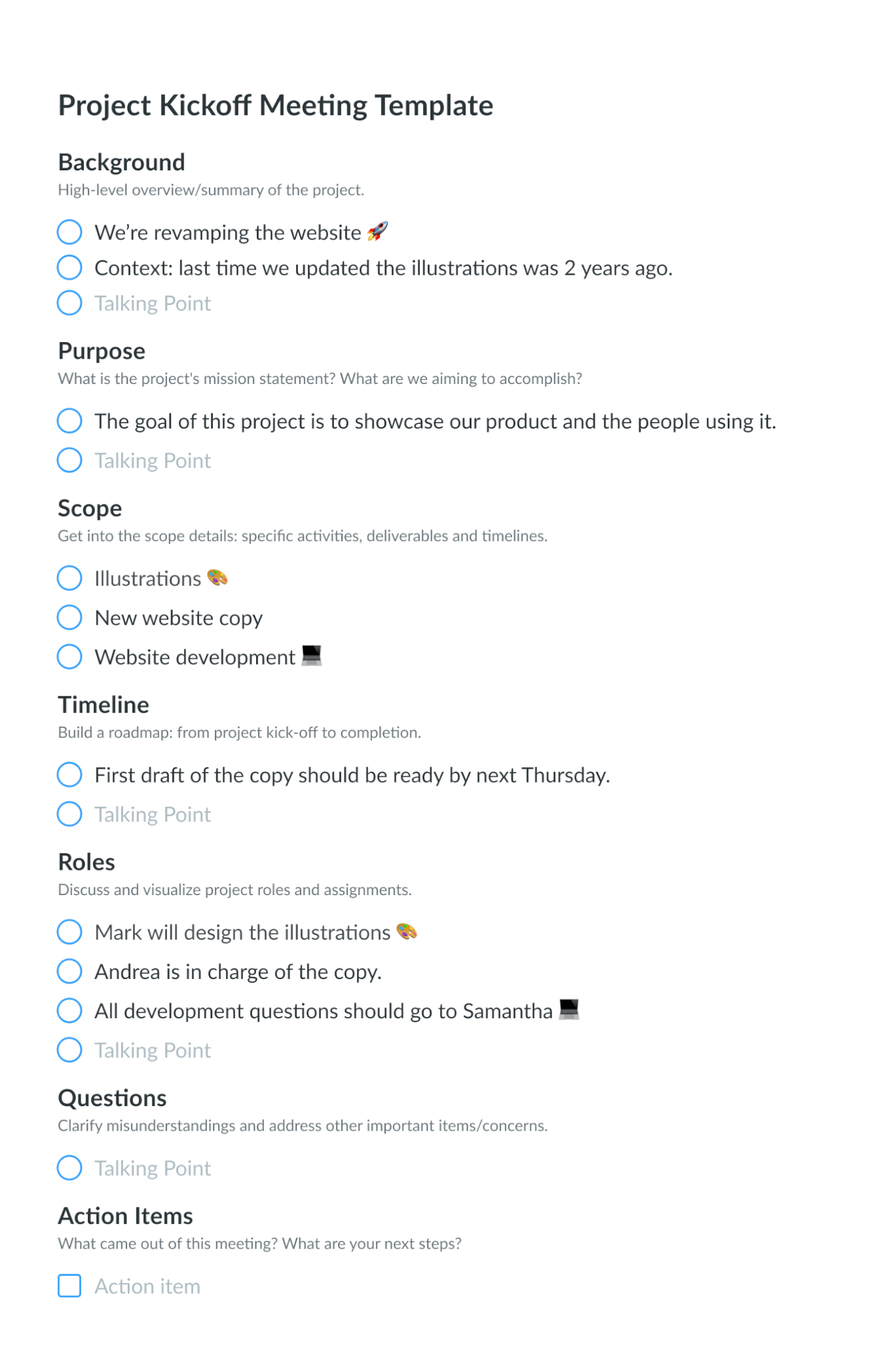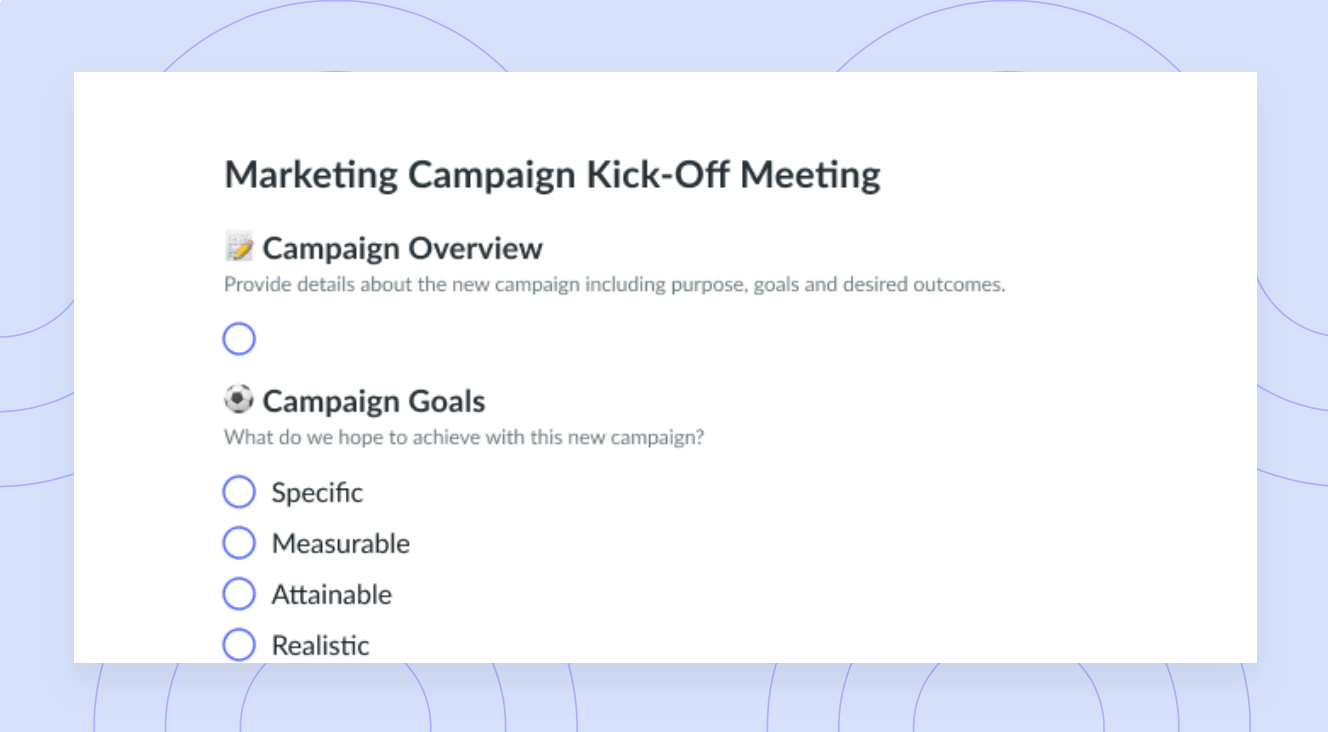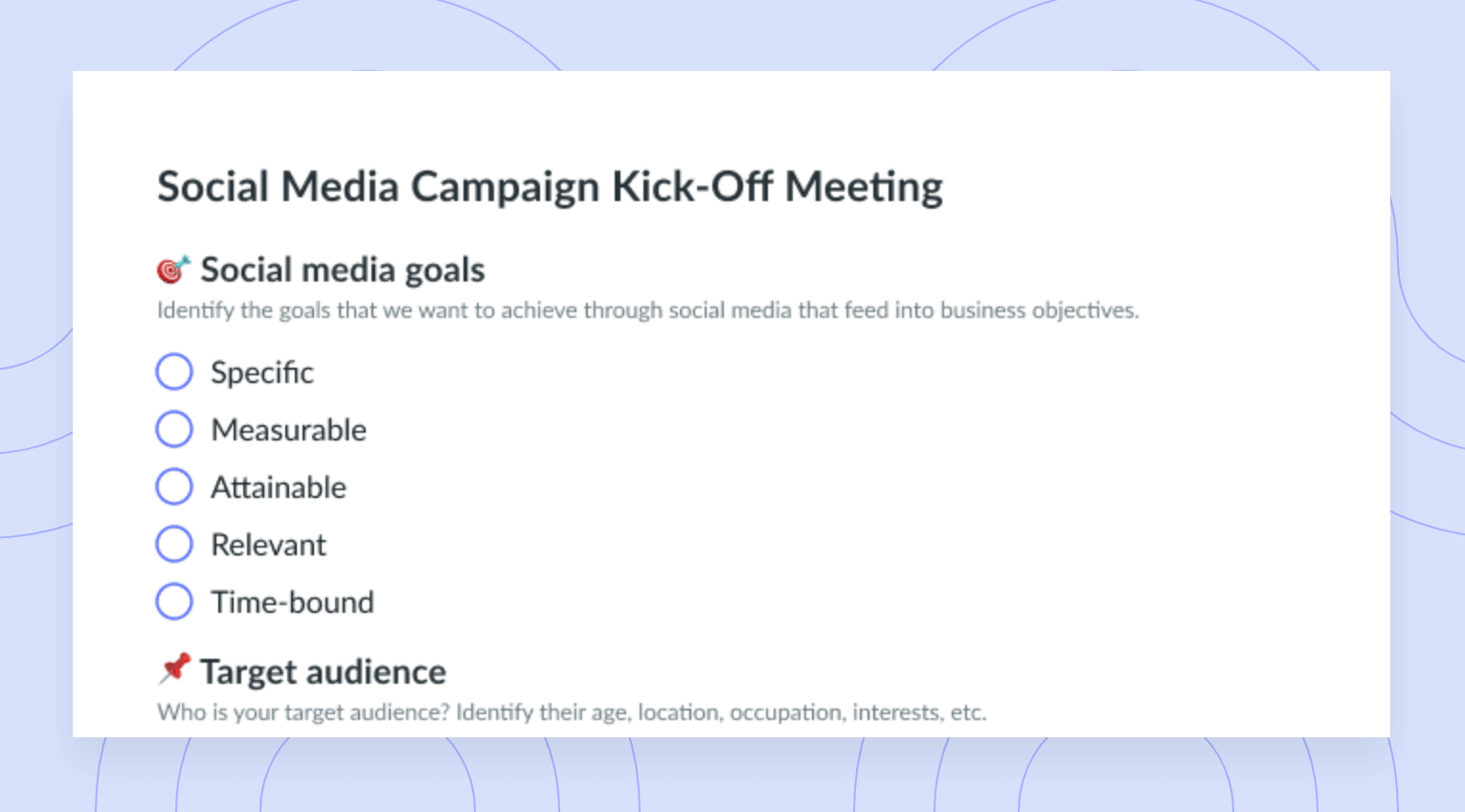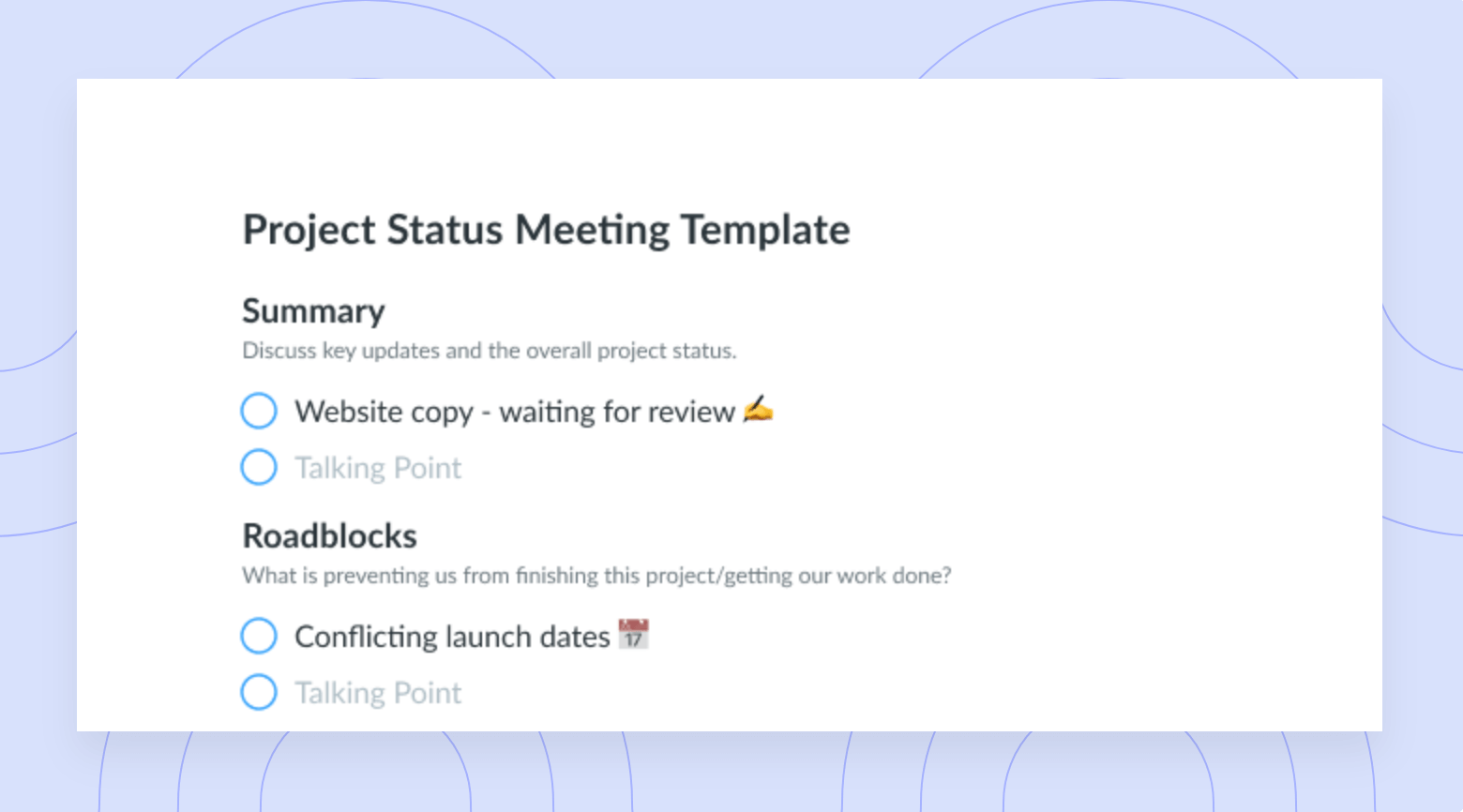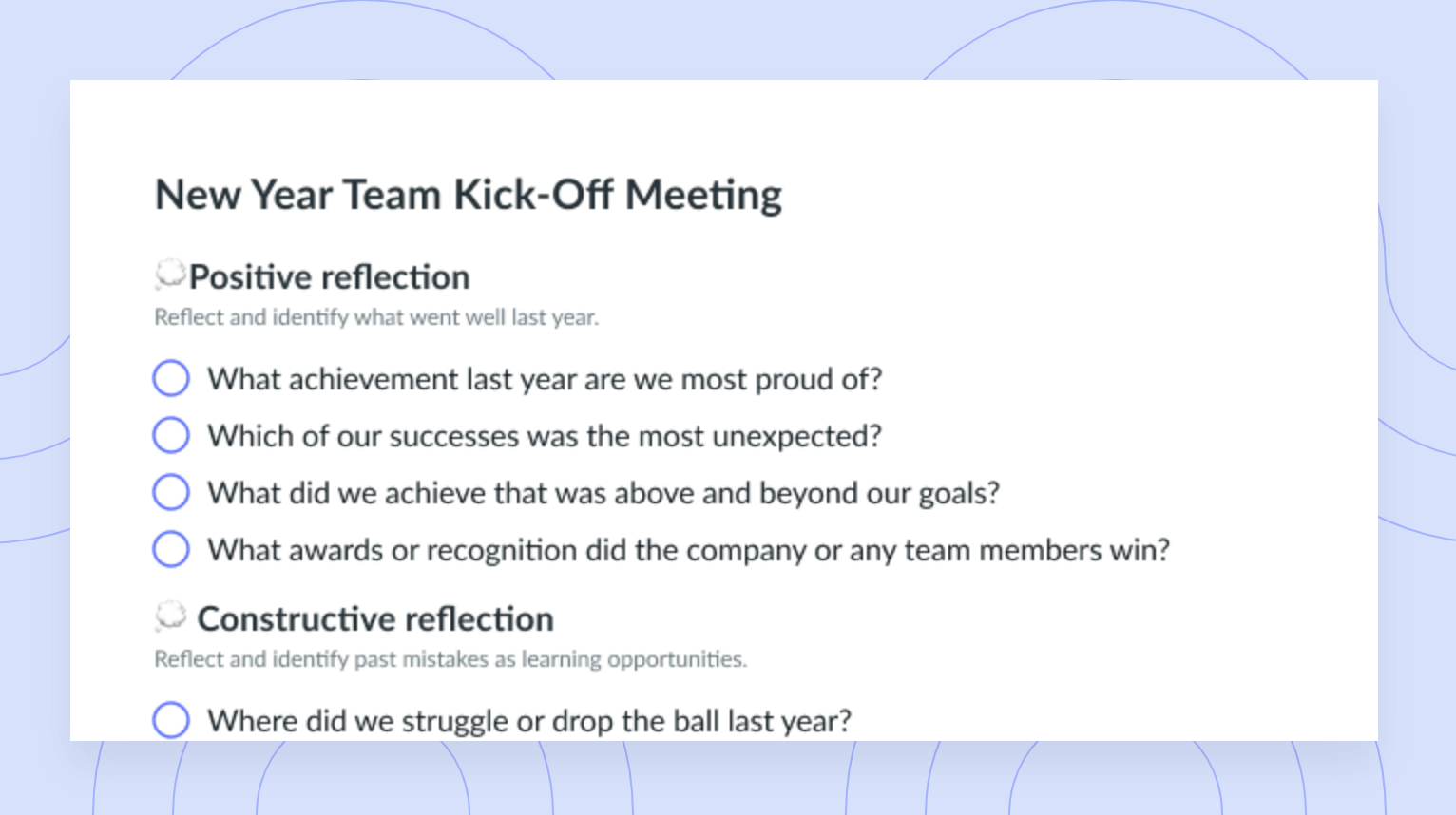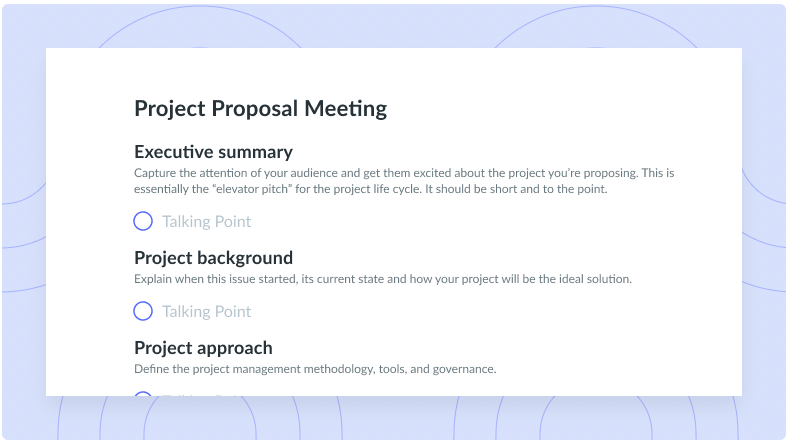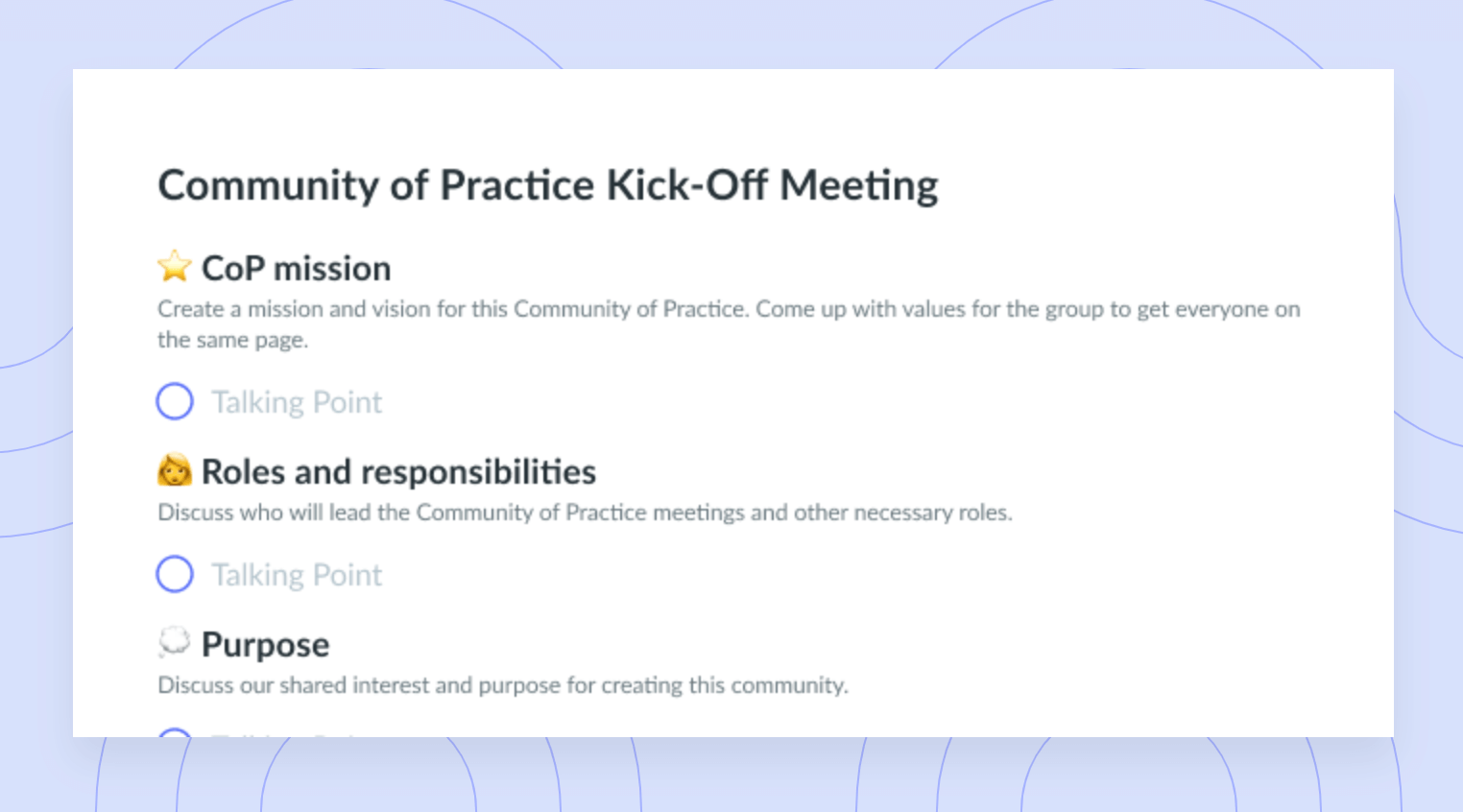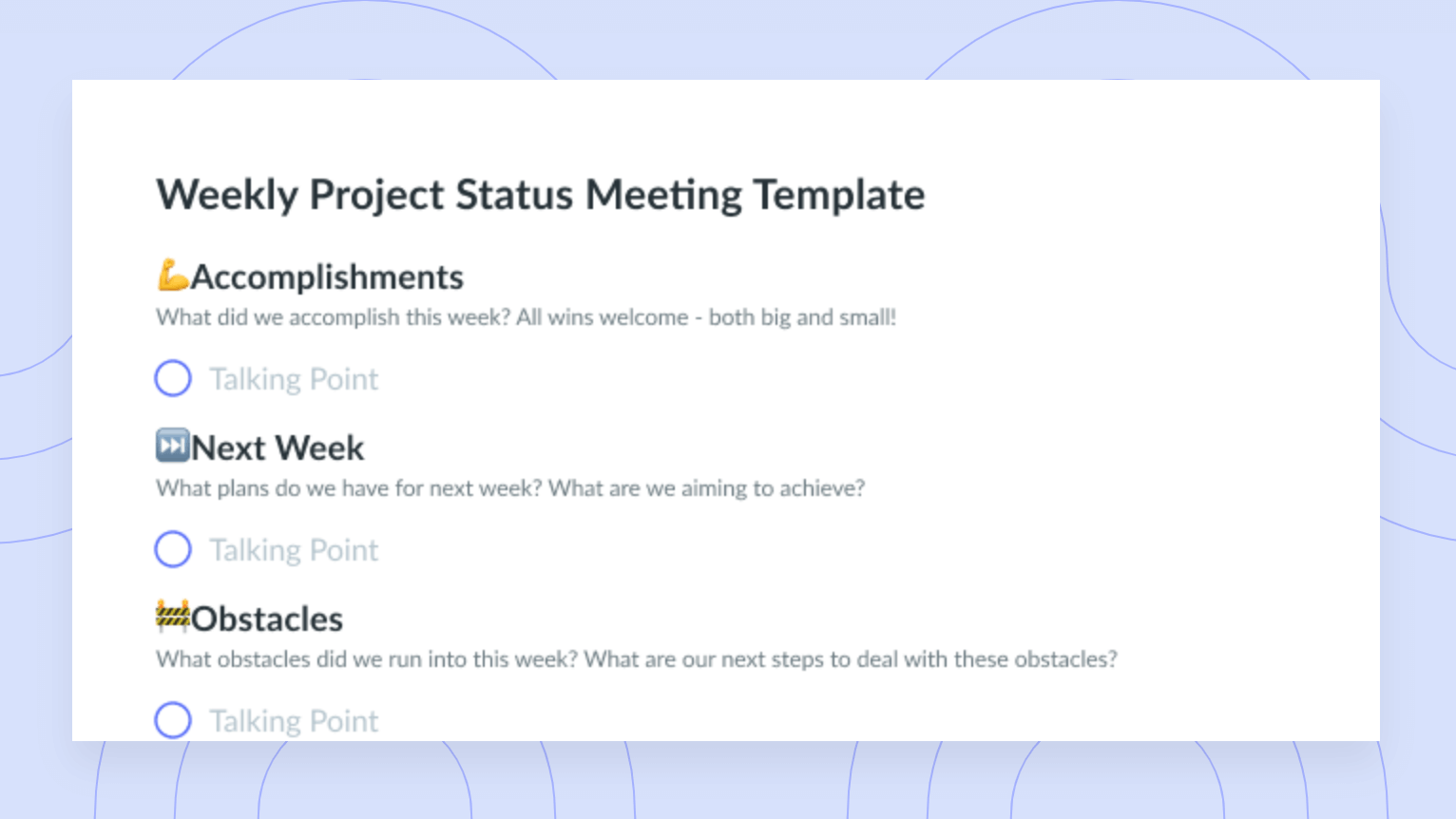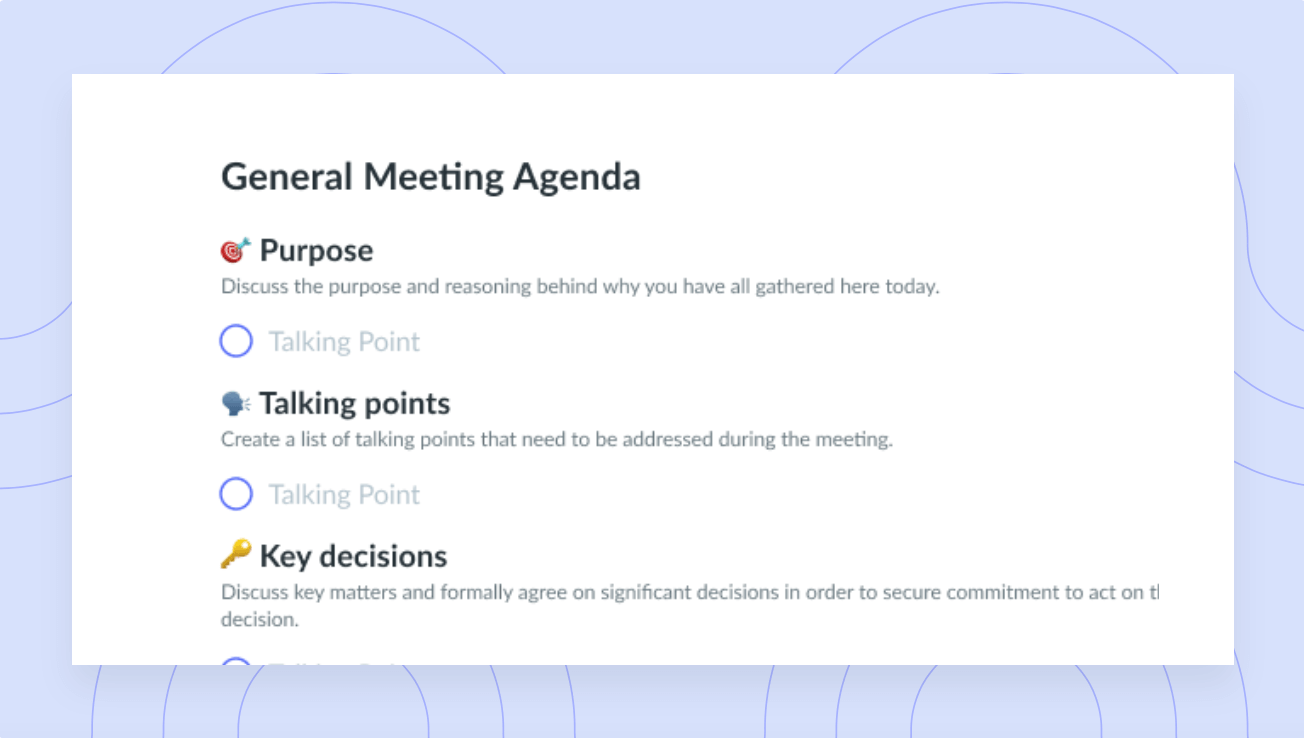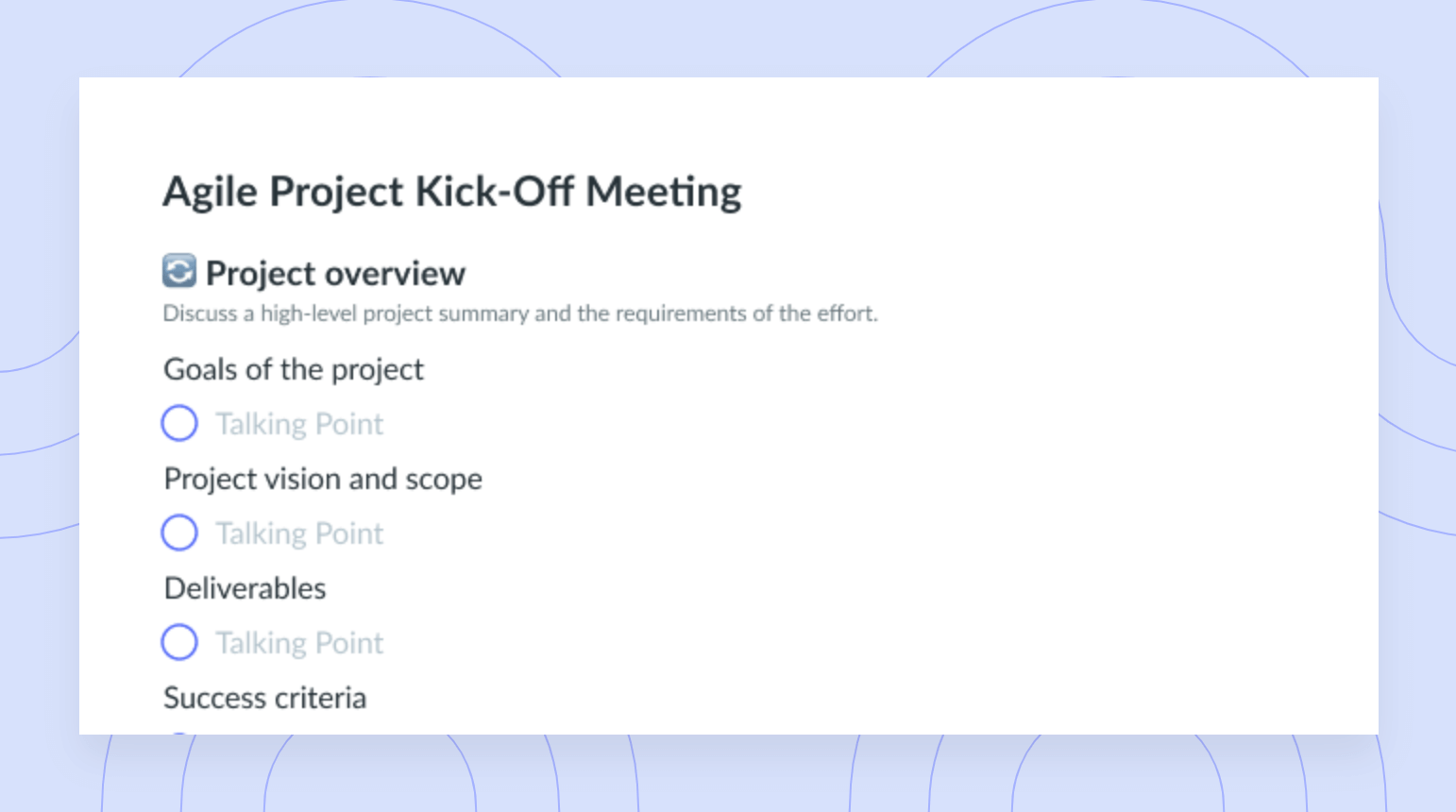
Project Kick-Off Meeting Agenda Template
Get this templateLaunch your projects effectively with our Project Kickoff Meeting Template. Designed for project leaders, this template helps teams clarify objectives, assign action items, and set milestones. Use this template in Fellow to delegate tasks, set due dates, and maintain a record of all project discussions.
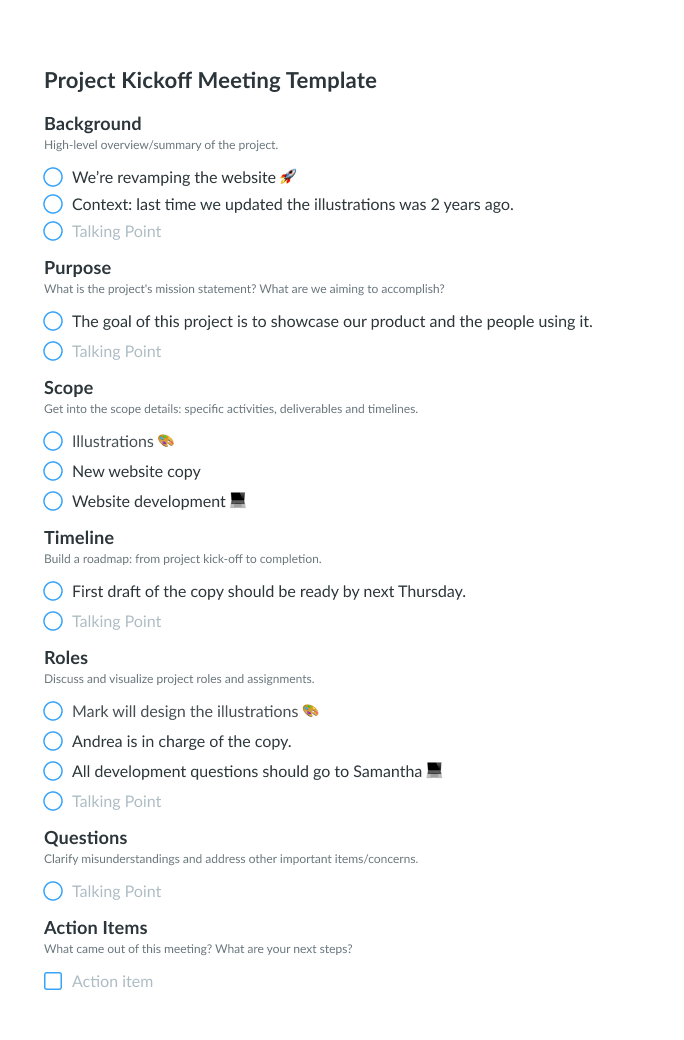

Project kick-off meetings
You are about to begin a new project, and it’s time to meet with your team to discuss how to execute the mission ahead successfully. To support you in doing so, Fellow has created a project kickoff meeting template.
The goal of your project kickoff meeting is for all parties involved to leave the meeting with a clear vision of the project and the deliverables that will be necessary for successful execution. This is why it is extremely beneficial to use this project kickoff meeting agenda to set the tone for the rest of the project and ensure the entire team is on the same page.
We have provided what should be included in your project kickoff meeting agenda to best prepare you to ensure team success. Use this project kickoff meeting agenda template to drive great results.
What’s inside this Project kick-off meeting template:
1 Background
Before you begin your high-level overview, make sure to welcome everyone and make any necessary introductions. The success of your project depends on collaboration between one another, so it is important to get to know each other. Provide the team with a general walk-through of your chosen agenda and what will be discussed.
Then, you can present a project summary that will illustrate why this project is being rolled out, what you would like to achieve, and how to make that achievement possible. Be sure to include any historical context which may add to an overall better understanding of the purpose behind the project.
2 Purpose
Creating a clear and concise mission statement is an essential component of your project kickoff meeting agenda. It may be helpful to think about your project through the eyes of your audience or customer and what you are aiming to accomplish as a team for the end-users.
It will also be strategic for you to think about if you have competitors who are rolling out or who have completed similar projects in the past. Think about what you are offering that sets you apart from others in the industry and how you can execute your project even more effectively.
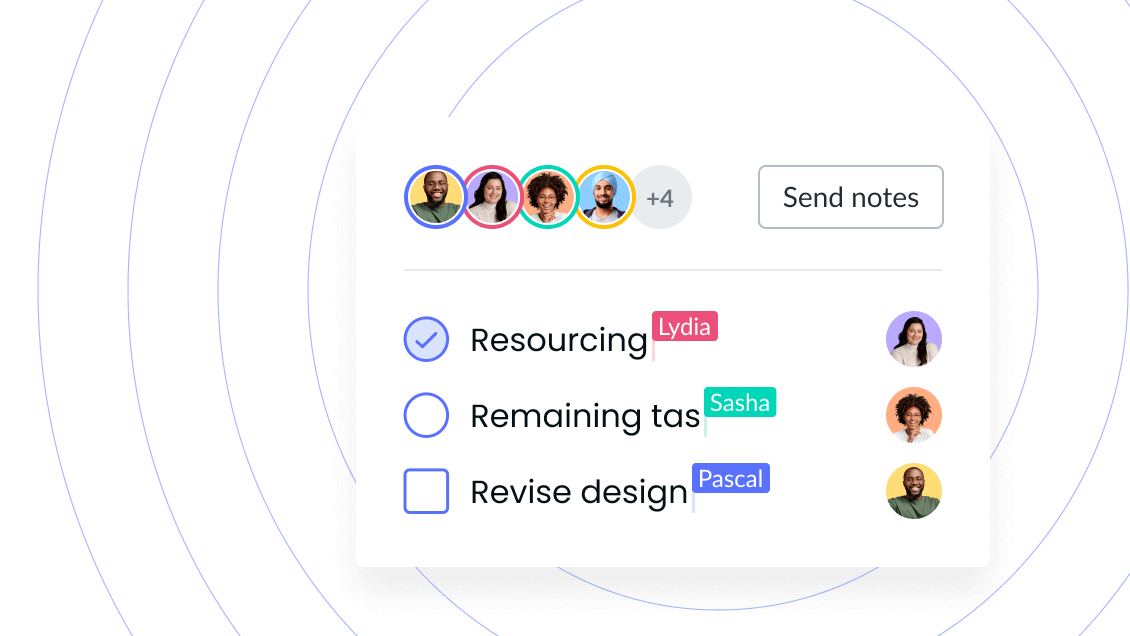
3 Scope
To be confident that deliverables will be on time and within budget, having a clear scope is essential to your project’s success. In this part of the meeting, get into the scope details, such as specific tasks, activities and any problems that need to be solved. This will clarify the expectations that need to be met by the end of the project.
“Your scope should outline a short description and key features or functions, inclusions/exclusions, and any assumptions and constraints, such as a strict budget or timeline… if you manage expectations and potential risks or bottlenecks early on, you can more easily manage scope creep and anticipate roadblocks.” – Liz Corrigan.
4 Timeline
Discussing the project timeline with your team means that it is time to build a comprehensive roadmap from project kickoff to completion. Your roadmap or timeline plan derives from your scope, which means that the next step is for you to define your deliverables, resources, milestones and handoffs.
It isn’t necessary to have specific dates in a kickoff meeting, but it will be helpful to provide loose dates that can later be modified as the project begins to unfold.
If you have participated in the execution of similar projects in the past, it is always helpful to use previous timelines for new projects of similar nature. Use your project timeline to record updates, make modifications and notes as the project continues to evolve.
5 Roles
In the next section of your project kickoff meeting agenda, you will address the specific roles of each contributing member.
On a group, team and individual level, it is important that the roles and assignments are very clearly defined. This part of the meeting can be used for you to discuss and visualize the various project roles and assignments. You should provide an overview of each person’s responsibilities within each phase of the project. It is a perfect opportunity to set expectations on an individual and group basis.
Setting these expectations before the project begins rules out any issues of ownership and allows the members of your team to take the initiative to complete their assigned duties.
6 Questions
It is difficult to get all of the members contributing to a project in the same room, at the same time. Be sure to use this opportunity to clarify any misunderstandings and address any other questions or concerns that your team may have. Addressing questions now will eliminate guessing or assumptions which will save time and energy that can be redirected towards the project.
Here are some other helpful pointers that you can use to close your project kickoff meeting agenda:
- Discuss the frequency of meetings for this project.
- Discuss the tools and technology that you will use to manage the project.
- Provide any documents or resources that the team can benefit from.
- Make yourself available to answer any additional questions after the meeting.
A successful project kickoff meeting will leave you and your team feeling excited and prepared to begin working on the project with a clear consensus of the vision and means for execution.
Ideas for your next project kickoff meetings will likely surface as a result after concluding your first meeting of this nature. Make sure you take notes to use these ideas and perhaps your group’s feedback to improve and add value to future project kickoff meeting templates.



